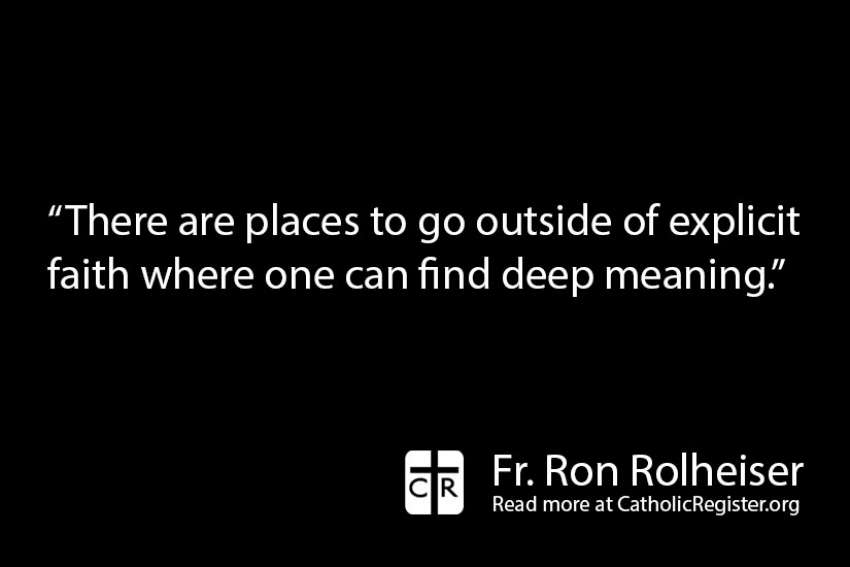Peter says these words to Jesus. But they are spoken in a very conflicted context. Jesus had just said something that upset and offended his audience and the gospels tell us that everyone walked away grumbling that what Jesus was teaching was “intolerable.”
Jesus then turns to His apostles and asks them: “Do you want to walk away, too?” Peter answers: “To whom else can we go?” But that’s more a statement of stoic resignation than an actual question.
His words function at two levels. On the surface, they express an unwanted humility and helplessness that sometimes beset us all: “I have no alternative! I’m so invested in this relationship that now I have no other options. I’m stuck with this!”
That’s a humble place to stand and anyone who has ever given himself or herself over in an authentic commitment will eventually stand on that place, knowing that he or she no longer has another practical choice.
But those words also express a much deeper quandary, namely, where can I find meaning if I cannot find it in faith in God? All of us have at some point asked ourselves that question. If I didn’t believe in God and had no faith or religion, what would give meaning to my life?
Where can we go if we no longer have an explicit faith in God? A lot of places, it seems. I think immediately of so many attractive stoics who have wrestled with this question and found solace in various forms of what philosopher Albert Camus would call “metaphysical rebellion” or in the kind of Epicureanism that Nikos Kazantzakis advocates in Zorba the Greek.
There’s a stoicism which offers its own kind of salvation by drawing life and meaning simply from fighting chaos and disease for no other reason than these cause suffering and are an affront to life, just as there is an Epicureanism that meaningfully grounds life in elemental pleasure. There are, it would seem, different kinds of saints.
There are also different kinds of immortality. For some, meaning outside of an explicit faith is found in leaving a lasting legacy, having children, achieving something monumental or becoming a household name. We’re all familiar with the axiom: Plant a tree, write a book, have a child!
Poets, writers, artists and artisans often have their own place to find meaning outside of explicit faith. For them, creativity and beauty can be ends in themselves. Art for art’s sake. Creativity itself can seem enough.
And there are still others for whom deep meaning is found simply in being good for its own sake and in being honest for its own sake.
There’s also virtue for virtue’s sake and virtue is indeed its own reward. Simply living an honest and generous life can provide sufficient meaning with which to walk through life.
So, it appears there are places to go outside of explicit faith where one can find deep meaning. But is this really so? Don’t we believe that true meaning can only be found in God?
What about St. Augustine’s classic line: “You have made us for yourself, Lord, and our hearts are restless until they rest in you.” Can anything other than faith and God really quiet the restless fires within us?
Yes, there are things that can do that, but all of them — fighting chaos, curing diseases, having children, living for others, building things, inventing things, achieving goals or simply living honest and generous lives — leave us, in an inchoate way, radiating the transcendental properties of God and working alongside God to bring life and order to the world. How so?
Christian theology tells us that God is One, True, Good and Beautiful. And so, when an artist gives herself over to creating beauty, when a couple has a child, when scientists work to find cures for various diseases, when artisans make an artifact, when builders build, when teachers teach, when parents parent, when athletes play a game, when manual labourers labour, when administrators administrate and, yes, even when hedonists drink deeply of earthily pleasure, they are, whether they have explicit faith or not, acting in some faith because they are putting their trust in either the Oneness, Truth, Goodness or Beauty of God.
Lord, to whom else can we go? You have the message of eternal life. Well, it seems that there are places to go and many go there. But these aren’t necessarily, as is sometimes suggested by misguided spiritual literature, empty places that are wrong and self-destructive. There are, of course, such places, spiritual dead-ends.
But, more generally, as we can see simply by looking at the amount of positive energy, love, creativity, generosity and honesty that still fill our world, those places where people are seeking God outside of explicit faith still has them meeting God.
(Fr. Rolheiser can be reached at ronrolheiser.com.)


